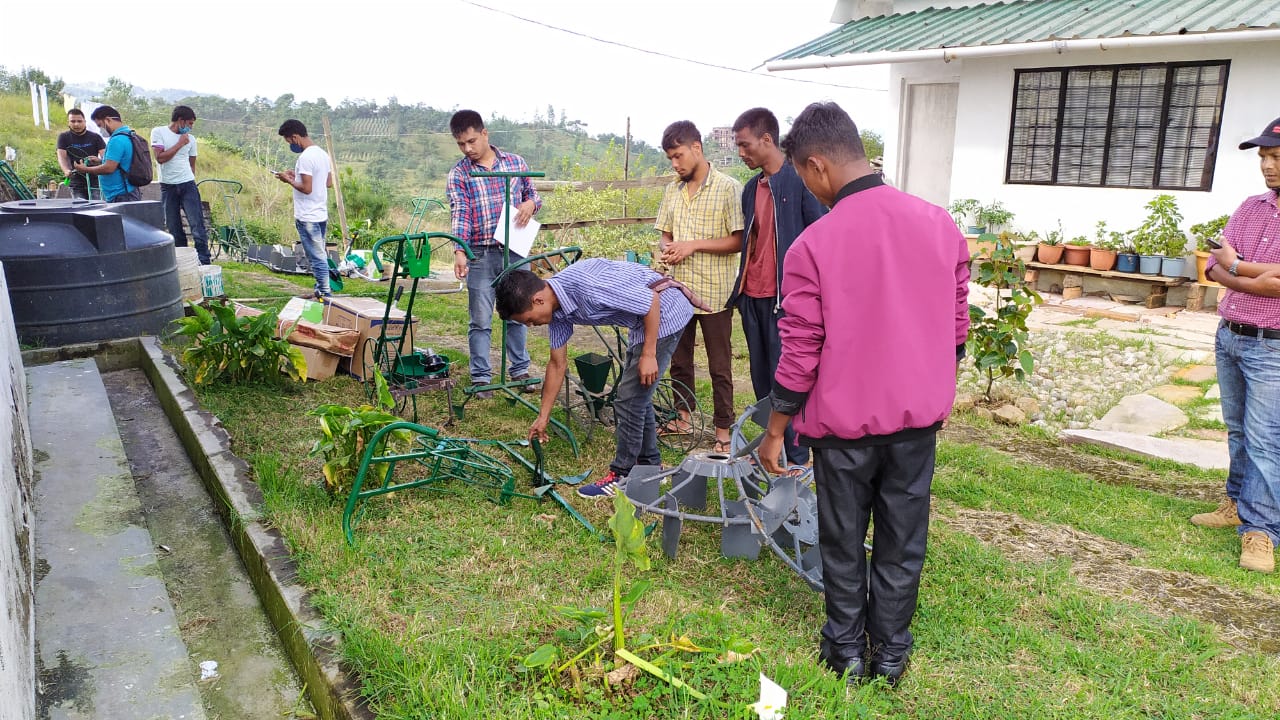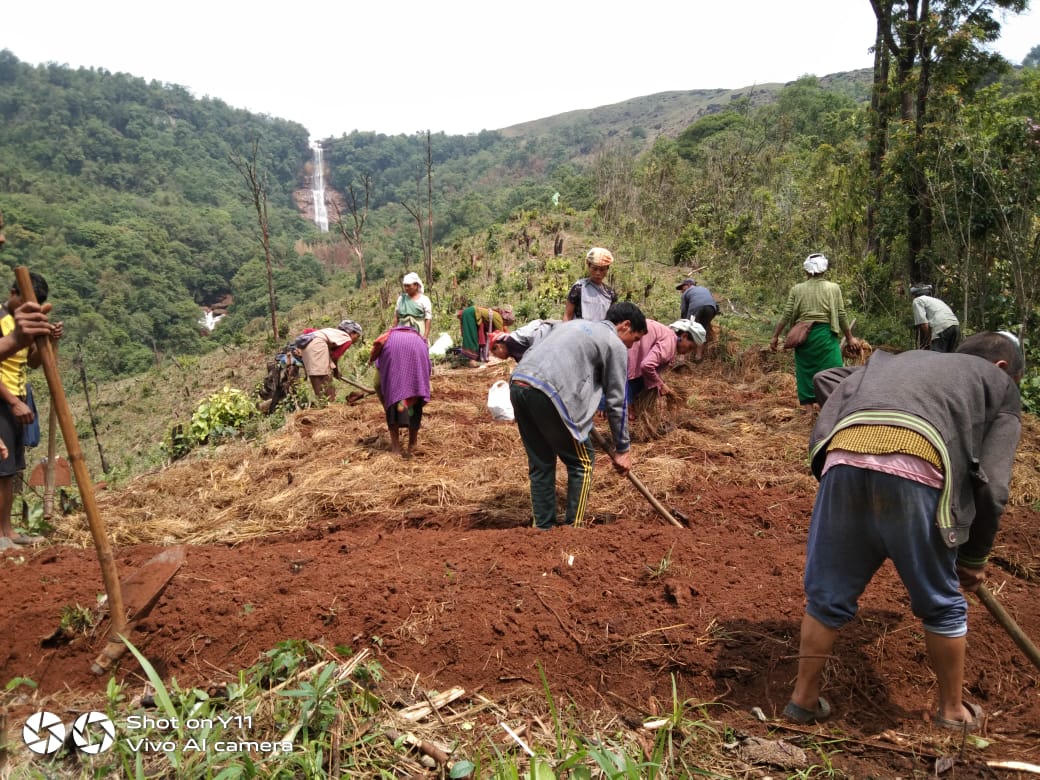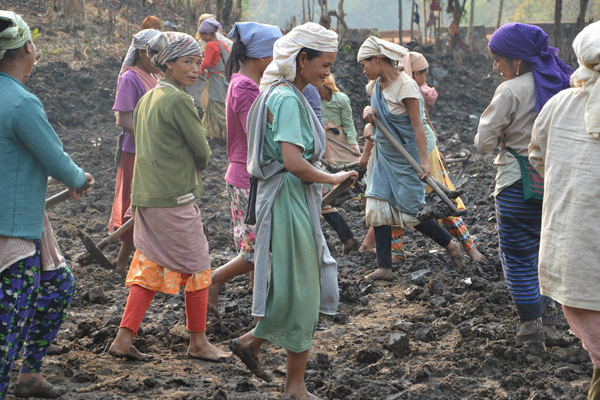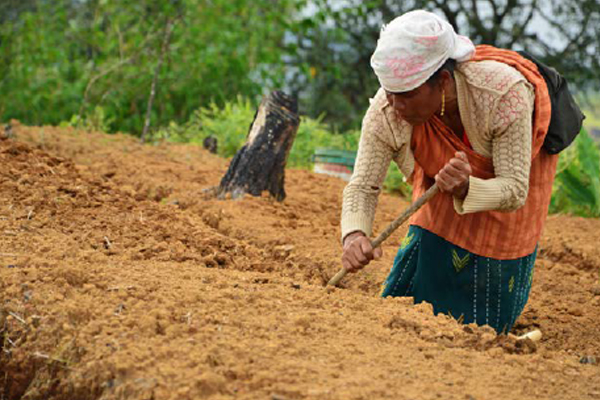Bolstering farming activities in Wapung Skur village

Collective Marketing initiatives are being promoted across the country as a response to the growing challenge of rural farmers having little to no control in supply chains – to regain bargaining power, to cut costs of transportation and storage, and to eradicate the influence and position of middlemen while realizing fair and competitive negotiation prices for their produce at the markets. In Meghalaya, the situation for farmers is no different. The trading model involves agricultural produce either being sold by individual farmers directly to traders in local or cluster level markets or being aggregated by the village aggregator who in turn sells it to the aggregator at the cluster level. Hence, these individual farmers are not able to keep up with varying market dynamics largely because of production and marketing issues that they face as individuals, coupled with a poor understanding and knowledge of how the market works, and if the current model is to persist, thousands of farmers and their standards of living will be impacted. Further, in the agriculture sector, the State is witnessing an increased dependence on mechanical power as opposed to traditional manpower. There is a shortage of human labour and costs of cultivation are escalating.
In view of this, Megha-LAMP has intervened on behalf of its farmers to ameliorate the existing conditions by establishing Collective Marketing Centres (CMC) in villages and clusters under the project. And to keep pace with the needs of the agriculture sector, Custom Hiring Centres (CHCs) are being set up across the State to contend with the challenges of the small and marginal farmers. The Chief Minister, Sh. Conrad K. Sangma inaugurated the first CHC at Kyiem Village in East Khasi Hills District on 2nd October 2020, and stated that there will be 72 CHCs established across the State as part of the farm mechanization initiative of Megha-LAMP. Since the occasion, 18 CHCs have been established in the State, one in each project Block, under phase 1 of implementation. Similarly, a total of 77 CMCs have been set up across Meghalaya.
The Wapung Skur Integrated Village Cooperative Societies (IVCS) Ltd.
The Wapung Skur Integrated Village Cooperative Society Ltd. (IVCS) is located in Wapung Skur, a Megha-LAMP village under Khliehriat C&RD Block, East Jaintia Hills District. The IVCS was formally registered on 30th May 2019. As of today, there are 142 shareholders – 61 men, 80 women, and 1 SHG – contributing towards a total share capital of Rs. 74,500 and a handsome savings deposit of Rs. 9, 99, 512. Recently, the IVCS has initiated the sanction of loans (personal loans) to its members and this undertaking has gone a long way in addressing the needs of the farming community and more specifically, the prevailing challenges that are associated with market linkage and access to finance. Significantly, because the IVCS is a “Grade A” cooperative society under the grading system of Megha-LAMP, as proven by the healthy number of shareholders in the IVCS, its share capital, and the amount of deposits mobilised and loans disbursed, Wapung Skur is now home to a CMC and a CHC of its own, functioning entirely independent from one another and supervised by two separate committees, but operating under the overall ownership and management of the progressive Wapung Skur IVCS Ltd.
Collective Marketing in Wapung Skur Village
A CMC is a primary farmgate infrastructure that is a node for aggregation, processing, and marketing of produce in the villages and clusters under the project, a genuine one-stop-shop at the village level. It is also an input supply unit. The basic infrastructure comprises of a collection space, a drying area, a retail area, and an office space. The thinking behind setting up CMCs under Megha-LAMP stemmed from a recognition that our farmers needed protection from the continuing exploitation of their interests, and hence, these Centres were established with the aim to create awareness on collective marketing and its merits, to initiate a system of aggregation and value addition at the market level, to ensure transparent and good governance for marketing of produce by a collective, and to enhance the skills of the stakeholder in areas of marketing and financial linkages. It may be noted that these CMCs have been set up only in project villages that have strong performing IVCS, such as the IVCS in Wapung Skur, and villages that have demonstrated high potential for increasing the incomes of farmers and farmer organizations.
Presently, the ongoing activity of the CMC in Wapung Skur is the supply of seeds and input to its farmer community members. The CMC Committee was sanctioned an amount of Rs. 5 lakhs as a Working Capital Loan under the project and recently, as part of the Chief Minister’s Mobilization Support for Producers initiative, the CMC was provided with a funding support of Rs.7 lakhs for pre-fabricated storage and related infrastructure. It has a separate account in the Wapung Skur IVCS Ltd. and all funds related to CMC functioning and maintenance are deposited in this account.
The CMC has fulfilled the demands of the community and other villages under Wapung Skur Cluster. Our fellow farmers no longer need to go to Ladrymbai or Khliehriat just for buying feed and seeds, thus saving precious time and money. Now, these products are available in the village at fair prices. We also have taken the extra step of delivering goods to our customers’ doors, and this has made things easier for them. The establishment of the CMC has benefitted individual and groups alike, and we are looking forward to increasing production of our Producer Groups, IVCS members and our neighbouring villages.
-Sunshine Ryngkhlem,
Secretary, Wapung Skur CMC
The Committee looks after the management and operation of the CMC. The administration comprises a Chairman, a Secretary, and two other members. The Secretary, Bah Sunshine Ryngkhlem, is the person entrusted with managing the CMC. He oversees the buying of materials and goods (vegetable and ginger seeds, pig and poultry feed, and fertilizers) from wholesale shops in Ladrymbai, East Jaintia Hills District, and is responsible for ensuring the availability of such materials at the Centre.

The members of the IVCS, Producer Groups, and other farmers are its consumers. They generate produce and supply it to the CMC who in turn supplies to the traders. Even pigs and piglets are sent to the CMC. Bah Sunshine informed that the demand is always high. The CMC recently sold 1 ton of ginger seeds. The seeds were bought from Ri Bhoi District, Meghalaya, and were sold at the CMC to the Ginger PGs. The CMC has also sold sacks of pig feed, poultry feed, and vegetable seeds. In the case of feed, they are selling at a Rs. 5/kg increased rate from the original price.
Presently, Wapung Skur CMC caters to 15 villages under the Wapung Skur cluster. The plan going forward is to continue with all market-related activities together as a collective. This will then help to develop improved linkages and credit facilities for the community’s farmers, and more importantly, better their share of the profits.
List of Agri Tools/Machineries for 1st Phase CHCs under Megha-LAMP
1. Power Tiller (Medium to Heavy)
2. Rotary Tiller (Electric Start)
3. Brush Cutter
4. Hand Grass Slasher
5. Post Hole Digger (Large)
6. Wheel Hoe with one sweep blade
7. Wheel Hoe with three sweep blade
8. Multipurpose ‘U’ Blade Weeder
9. Multipurpose ‘V’ Blade Weeder
10. Zero Tillage furrow opener (manual)
11. Adjustable Row Markers
12. Knapsack Sprayer (Plastic)
13. Foot sprayer
14. Fruit Harvester (Crown Type with Bamboo Handle)

Custom Hiring Centre (CHC) in Wapung Skur Village
On 16th October 2020, the team from the East Jaintia Hills District Project Management Unit (DPMU) together with the Wapung Skur CHC Committee members went to MBMA Office in Shillong to transport the farm machinery procured by the State Project Management Unit to the village. The machines were procured for an amount of Rs. 3lakhs. Following their return, the Mechanical Engineer from the Agriculture Department in Jowai conducted a three-day training for the committee members on how to operate and run the machines.
Wapung Skur was chosen as a feasible location for setting up a CHC due to the aforementioned strong position of its IVCS. The CHC is owned and managed by the IVCS in a social enterprise mode and provides fee-based custom hiring of Agri tools and farm machinery at reasonable and fair charges. Members of the IVCS, Producer Groups as well as other farmers who reside in Wapung Skur and the villages under its cluster are its frequent visitors.
The CHC Committee is entrusted with managing day-to-day operations. There is a Manager, a Chairman and 4 other members. The Committee has the final say on the charges for using a machine. The manager makes his estimates based on the machine requested for rental, the length of the particular field, the conditions of the field, and the type of land.
Since opening its doors, the machines have been hired by many farmers of the community, a reported 30 plus number of times according to the manager of the CHC Committee. The power tiller, in particular, has been in high demand. In the case of a paddy field, the charge for using the power tiller is Rs. 1000 per 450ft for IVCS members and Rs. 1200 per 450ft for non-members. For a normal dry field, the charge is Rs. 600 per 112ft for IVCS members and Rs. 700 per 112ft for non-members.

The establishment of the Wapung Skur CHC has benefitted over 30 farmers from the cluster, all of whom have reported higher production in shorter time frames. The Committee has laid down plans to expand the services of the CHC and to procure more machines which, as an encouraging by-product, will create more job opportunities for the people of Wapung Skur.
Rural Finance
The component ‘Rural Finance’ aims to ensure for the farmer, improved access to financial services and a secured linkage to supply chains. Megha-LAMP has registered 300 community-promoted IVCS across the State, strategically setting them up in areas where the formal banking sector currently has no reach. With their establishment, rural citizens now have access to basic financial services such as savings and loans, and can also gain access to loans and other facilities being offered by formal banks. The unique setup of the IVCS also allows for the provision of other services which may include the supply of input and essential items sourced from outside the village, aggregation of Agri and allied products, sale of groceries, and storage, among others.
As of May 2021, the IVCS intervention is affording exclusive services to over 66,650 households across Meghalaya.



